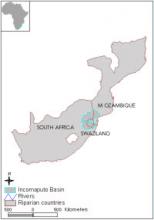Main informations

Basic data
Website
Geographical scope
The Incomati watercourse is the system of the Incomati River, which includes the tributaries Mazimechopes, Uanetze, Massintonto, Sabie, Crocodile, Komati Rivers, and the estuary and the Maputo watercourse is the system of the Maputo River, which includes the tributaries Pongola and Usuthu Rivers, and the estuary.
| Countries | Area |
|---|---|
|
Mozambique
|
16100km²
|
|
Central African
|
47700km²
|
|
Swaziland
|
13600km²
|
Function/mandat
The TPTC is an advisory committee without executive powers. It advises the contracting parties on technical, legal, administrative, and other reasonable measures related to the development and management of the Incomati and Maputo watercourse systems and it is to remain in force until superseded by another comprehensive water agreement.
Organisation
The Tripartite Permanent Technical Committee is the only organ established by the Interin IncoMaputo Agreement as an advisory committee without executive power
The Tripartite Permanent Technical Committee (TPTC), which was established in 1983, is the joint body for cooperation covering the Incomati and Maputo Rivers.
The Interim IncoMaputo Agreement reestablished the TPTC as an advisory committee without executive power. The joint body is supposed to meet at least twice
a year with the purpose of implementing the Interim IncoMaputo Agreement. The Chairman-ship and the venue of meetings rotates among the signatory states.
In the Interim IncoMaputo Agreement, the three governments agreed on a list of “Reference Projects” to be implemented.
Based on determining criteria, Reference Projects are mentioned for Mozambique, South Africa and Swaziland.
The parties were required to exchange available information and data regarding the hydrological, geo-hydrological, water quality, meteorological, and environmental
conditions of the watercourses in order to enable planning, development, and management of the shared watercourses.
Any planned water resource development and water utilization projects would only commence if the provisions of the Revised SADC Protocol on the procedures of
notifying other Riparian Countries of planned measures had been complied with.
Prior to signing the Interim IncoMaputo Agreement, the TPTC had already adopted the “Resolution on the Exchange of Information and Water Quality.” However measures were also instituted to establish regular comparable monitoring systems, methods and procedures; and to report on the status and trends of the associated aquatic, marine, and riparian ecosystems.
The TPTC shall adopt – by consensus – its rules of procedure that will govern the meetings. The Interim IncoMaputo Agreement further stipulates that any dispute shall be settled amicably through consultation and negotiations among the parties. In cases in which a dispute is not settled within one year of the date upon which such negotiations were requested, it may be submitted for arbitration by either Party. If the disputing parties do not agree on the subject matter of the dispute, the arbitration tribunal shall determine the subject matter according to its rules.
The 1983 Agreement stipulates that each government shall bear the cost of its representatives and the cost of any person it wishes to appoint as advisors. No specific
provisions are mentioned in the Interim IncoMaputo Agreement of 2002 on funding.
No specific provisions.
In 1999, the TPTC decided to include the Maputo River system and to conduct a Joint Maputo Basin Study, which was completed in 2001. This decision broadened the
agenda, which so far had mainly focused on the Incomati River. After more than three years of negotiations, the ministers of the riparian states signed the Interim IncoMaputo
Agreement in 2002. Its major achievement was that the riparian states agreed on previously disputed hydrological data, a number of water management/environmental
measures and a water sharing formula including secure water supply to Maputo city.
Legal basis
| Date | Treaty name | Signatories | Basin |
|---|---|---|---|
|
1983-02-17
|
Tripartite Technical Committee
|
Mozambique
South Africa
Swaziland
|
- |
|
1991-02-15
|
Water Ministers Meeting
|
Mozambique
South Africa
Swaziland
|
Incomati, Komati
|
|
1992-03-13
|
Joint Water Commission Treaty
|
South Africa
Swaziland
|
Komati, Maputo
|
|
1992-10-07
|
Utilizaton of Komati Water Resources Agreement
|
South Africa
|
Komati, Kangwane
|
|
2002-08-29
|
IncoMaputo Agreement
|
Mozambique
Swaziland
South Africa
|
Incomati, Maputo
|
Challenges
Underdeveloped Mozambique not party to KOBWA, the river basin organization mandated to operate the dams, insufficient flow for environmental requirements, member states at different stages of development and insufficient funding.
 AWIS/Sadieau
AWIS/Sadieau